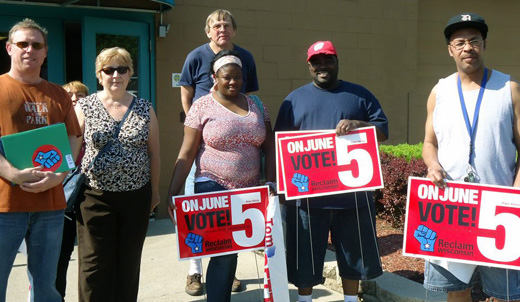
MILWAUKEE (PAI) – With fewer than two weeks to go in the nationally watched recall campaign against right-wing Wisconsin GOP Gov. Scott Walker, polls show a near dead heat in the bitter battle pitting labor’s legions against Walker’s millions.
On one side in the June 5 election is the governor, who spearheaded the national right-wing drive against workers by eagerly jamming through legislation killing collective bargaining rights for 200,000 state and local workers. He’s backed by at least $25 million in cash for campaign ads, most of it raised from right-wing and big business ideologues from outside the state. The national GOP threw in $6 million more.
On the other side are the state’s unions and their allies. They’re upset not just at losing their rights, but also at Walker’s tax cuts for the rich, his anti-woman laws, such as killing women’s right to sue against pay discrimination on the job, scandals surrounding his aides and his deep cuts to state aid to local schools. And they remind voters that Walker bragged he would bring jobs to Wisconsin, but his policies have pushed the Badger State into leading the nation in job losses.
“Whether you’re a Wisconsinite or not, the stakes are too high to sit this election out,” Wisconsin AFSCME member Clyde Weiss wrote in a recent blog. “Walker is the poster boy for the anti-union attacks we have faced from coast to coast and has already raised millions of dollars from some of the most anti-union people in the country, including billionaire right-wing extremist David Koch.”
But the workers and their allies are have difficulties caused by lack of time to reach every voter. Additionally, Democratic Party gubernatorial nominee, Milwaukee Mayor Tom Barrett, is short of campaign cash. He lost to Walker in Nov. 2010 and some unions did not support Barrett in the primary to choose a Walker foe. National Democrats have contributed little in money and nothing in manpower to Barrett’s drive, leading to complaints from state Democrats.
Opinion polls vary. Greenberg Quinlan, a Democratic firm, gave Walker a 50%-47% lead, within the margin of error, but said Barrett led among independents, 50%-44%. A GOP-leaning pollster gave Walker a 9-point lead. An independent poll by Marquette University Law School puts Walker up by six. An internal state Democratic tally says Walker and Barrett are in a flat tie. Walker’s approval rating is below 50%.
All that has prompted unionists, who are leading the “Reclaim Wisconsin!” recall drive, to campaign even harder, not just for Barrett, but also for his running mate, lieutenant gubernatorial nominee Mahlon Mitchell, president of the state’s Fire Fighters Association. He faces Walker’s lieutenant governor, whom the petitioners also recalled.
The Wisconsin AFL-CIO had one phone bank running full-time in Milwaukee and opened a second there the week of May 21. AFSCME is distributing a “We Are Wisconsin!” film and videos of rank-and-file workers discussing what the election and Walker’s agenda means to them and their neighbors.
IAFF is out campaigning for its leader. Other unions marshaled low-income state janitors and nurses who lost rights.
The state labor federation also came up with an online “Friends and Neighbors” video tool of its own. Besides the positive message it carries about restoring Wisconsin’s history of civility and workers’ rights, it also has a clip of Walker saying how he was going to use ugly “divide and conquer” tactics to win the recall race.
University of Wisconsin-Milwaukee custodian Mark Bussian told the city’s labor council – while volunteering a second time – that, “I’m out here to recall Walker because he took away our collective bargaining rights. It is clear that Walker is very much out for himself. He does not care about the needs of the people of Wisconsin.”
And Chris Czubakowski, a Postal Workers Local 3 member from Wauwatosa, told the state fed the Walker recall is “a fight to protect middle class workers.” That’s a theme state AFL-CIOs, national unions and the national AFL-CIO are using on the campaign trail this year to stand up and fight back against GOP-Right Wing-big business policies being pushed everywhere from Congress to City Hall.
“I could go on for hours with people I call about why we need to recall Walker,” said Czubakowski. “But since everyone has busy lives I usually stick to talking about Walker’s attacks on workers, his attacks on the next generation with his cuts to education and how recalling Walker is about preserving a strong middle class for Wisconsin.”
“Walker underestimated the historic opposition from you and hundreds of thousands of other Wisconsinites who worked together in unprecedented ways to stand up to his policies that have hurt working families and our communities,” the state fed said. “It is going to be those same grassroots efforts of people like you talking to their friends and neighbors until Election Day that will show Walker he cannot divide and conquer us.” Besides Walker and his #2, four GOP state senators also face Democratic foes in recall votes. The state senate, which had been GOP-run, is now a 16-16 tie.
Marty Beil, executive director of AFSCME Council 24 – one of several AFSCME councils representing state and local workers whom Walker stripped of their rights – downplayed pre-primary disagreement among unions between Barrett and other Democratic hopefuls. Unions united about backing IAFF’s Mitchell for the state’s number two post.
“The ultimate goal has always been to defeat Walker. The grassroots campaign we’ve built to counter Walker’s millions from out-of-state billionaires will be working hard to help Barrett,” Beil said.
Photo: Heading out to knock on doors. Wisconsin State AFL-CIO facebook page.












Comments